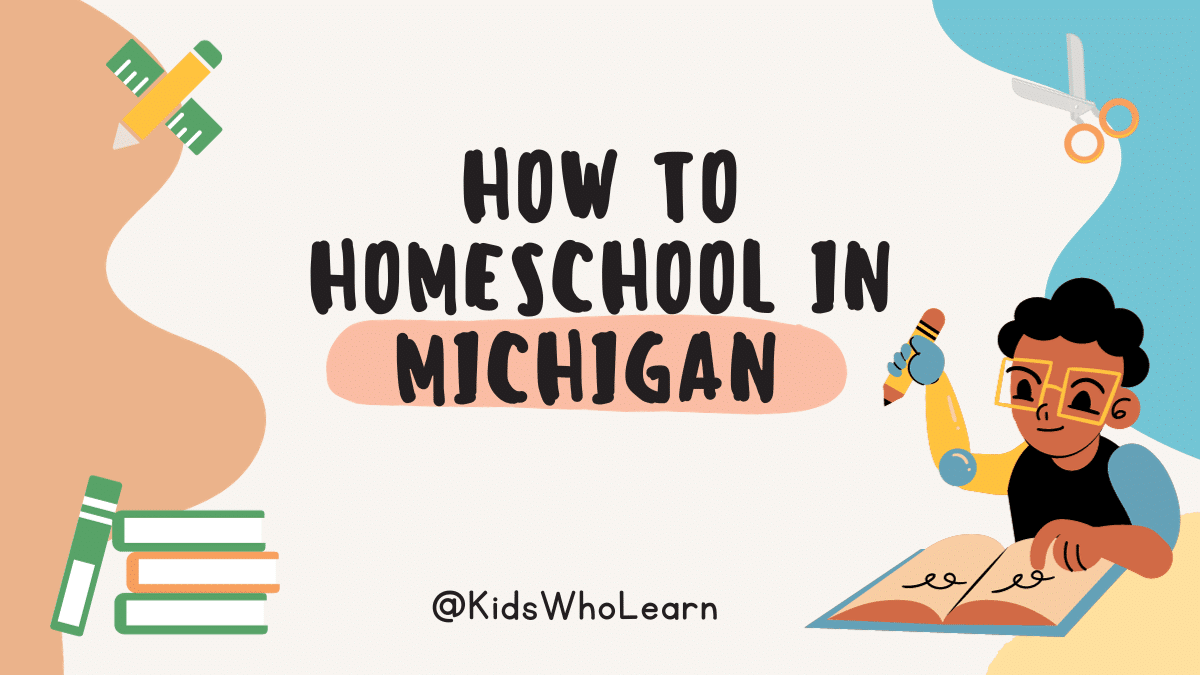Homeschooling is a popular and effective alternative for families in Michigan seeking a tailored and enriched educational experience for their children. This flexibility allows you to provide a personalized curriculum for your child, while also fostering a unique bond between parent and child. In order to make the most of this opportunity, it’s crucial to understand the laws, plan the curriculum, and create a supportive learning environment.
Michigan is considered a relatively homeschool-friendly state, with some requirements to ensure that your child is receiving a well-rounded and comprehensive education. As a homeschooling parent, you’ll need to consider several aspects such as curriculum planning, record keeping, and fostering socialization. It’s essential to understand the importance of leaning on local support, preparing for the college admission process, and seeking answers to frequently asked questions.
Key Takeaways
- Understand and adhere to Michigan homeschooling laws to ensure a compliant and beneficial experience
- Plan your child’s curriculum and create a facilitative learning environment for their educational growth
- Prioritize interaction, socialization, and record keeping while taking advantage of local support and resources
Understand Homeschooling Laws in Michigan
As you prepare to homeschool in Michigan, it is crucial to familiarize yourself with the state’s homeschooling laws. By understanding these guidelines, you can ensure a smooth and successful homeschool journey for you and your children. In this section, we will cover the legal requirements related to homeschooling in Michigan, including notification, structured education plans, and test scores reporting.
Notification for Homeschooling
In Michigan, it is important to know that you are not required to notify your local school district when you begin homeschooling, if you are providing home education under the exemption for homeschooling in the Michigan State Constitution (which includes teaching a good citizenship curriculum). However, if choosing to homeschool under the non-public school option, you are required to inform the local school district through a letter stating your intent to homeschool.
Handle Structured Education Plan
A structured education plan is crucial for homeschooling success in Michigan. You should ensure you have a thought-out curriculum that addresses the basic subjects, such as reading, writing, math, science, and social studies. There is flexibility in the choice of curriculum and teaching methods, which allows you to tailor the learning experience to your child’s needs and interests.
Test Scores Reporting
In Michigan, homeschool students are not required to take standardized tests or report their test scores to the state. However, it may be beneficial for you to assess your child’s academic progress periodically through testing to ensure they are meeting educational goals. This can also aid in identifying areas that may need additional attention or improvement.
Remember, by understanding the homeschooling laws in Michigan and adhering to these regulations, you will create a solid foundation for your child’s education while ensuring a positive, fulfilling homeschool experience.
Curriculum Planning
When it comes to homeschooling in Michigan, planning your curriculum is essential. Here, we’ll cover four key subject areas: English, Math, Science, and Social Studies. Remember to check Michigan’s homeschooling laws and guidelines to ensure you’re following all requirements.
English
Developing strong communication skills is crucial for your child’s success. For English, consider focusing on the following:
- Reading: Choose various types of literature at different reading levels, such as novels, short stories, poetry, and non-fiction.
- Writing: Encourage your child to practice writing through essays, creative writing, and research papers.
- Grammar: Explore grammar rules, punctuation, sentence structure, and spelling.
Create a reading list and a writing prompt schedule to help guide your child’s progress.
Math
Mathematics is an essential subject that helps develop problem-solving skills. To build a comprehensive math curriculum, incorporate these key components:
- Number Sense: Understanding numbers, place values, and relationships between them.
- Operations: Teaching addition, subtraction, multiplication, and division.
- Geometry: Introducing shapes, patterns, and measurements.
- Algebra: Learning about expressions, equations, and functions.
Use textbooks, online resources, and real-life examples to make math engaging and relatable.
Science
Science promotes critical thinking and curiosity about the world. There are several branches of science to cover, including:
- Physical Science: Introducing concepts like force, energy, and the properties of matter.
- Earth Science: Explore topics related to weather, geology, and astronomy.
- Life Science: Teach about living organisms, ecosystems, and genetics.
Hands-on experiments, nature walks, and science documentaries are excellent ways to bring these subjects to life.
Social Studies
Social studies encompass a wide range of topics to help your child understand the world around them. Key areas to explore are:
- History: Learn about significant events, people, and culture from the past.
- Geography: Study the physical features of Earth and how people interact with their environment.
- Civics: Understand government systems, democratic processes, and citizenship responsibilities.
Incorporate primary sources, field trips, and current events discussions to facilitate a well-rounded understanding in social studies.
Facilitate Learning Environment
Creating a conducive learning environment is crucial for the success of your homeschooling journey. Providing a comfortable, organized space for learning will help your child stay motivated and focused.
Choose a dedicated space: Select an area in your home that is free from distractions and can be used solely for homeschooling. This can be a separate room or a designated corner within a common area. Make sure the space has access to natural light and is equipped with necessary furniture like a desk, chair, and shelves for books and supplies.
Organize materials and supplies: Keep your homeschooling materials and resources organized so that they’re easily accessible during lesson time. Use bins, folders, and labels to categorize different subjects and keep track of assignments. This will help your child develop good organizational skills and make it easier for you to manage the learning process.
- Create subject-related binders
- Label storage containers for materials
- Keep a calendar with important dates and deadlines
Incorporate technology: Utilize technology to enhance and support your homeschooling curriculum. There are numerous educational websites, apps, and software available to develop specific skills and provide additional resources. Be sure to monitor your child’s online activities and set limits on screen time to help maintain a balanced learning experience.
Encourage self-directed learning: Give your child some autonomy by involving them in the learning process. This can involve setting personalized goals, selecting topics of interest, or choosing projects they’re passionate about. Encouraging choice and independence will help your child develop self-motivation and a sense of ownership over their educational journey.
Remember, a friendly and supportive learning environment can make a significant difference in your child’s homeschooling experience.
Interaction and Socialization
Homeschooling your children in Michigan offers numerous opportunities for interaction and socialization. While you may initially be concerned about how to help your kids make friends and develop social skills, there are plenty of ways to address this issue.
First, consider joining local homeschool support or co-op groups. These groups consist of other homeschooling families and can serve as a valuable resource in your homeschooling journey. By attending meetings and events, your children will have the chance to interact with their peers, participate in group activities, and build relationships.
Another option is to enroll your children in extra-curricular activities. Consider activities that match their interests, such as sports teams, art classes, or music lessons. Many of these programs provide wonderful avenues for children to connect with others who share their passions and develop their teamwork skills.
While homeschooling, don’t forget to incorporate field trips into your curriculum. Visiting museums, nature centers, or participating in community events can provide educational opportunities as well as chances for your children to come face-to-face with other kids and adults. This also helps build your child’s communication and social skills in various settings.
Lastly, you can also become involved in volunteer work or community service projects as a family. Volunteering allows your children to give back to the community, meet new people, and develop a sense of responsibility and empathy.
Remember, fostering healthy social growth for your homeschooled children is just as important as their academic development. Michigan offers an array of resources and activities to ensure your kids have ample opportunities for interaction and socialization throughout their homeschooling experience.
Record Keeping
As you begin your homeschooling journey in Michigan, one crucial aspect to consider is record keeping. Keeping accurate records will not only help you stay organized, but also ensure you meet Michigan’s homeschool requirements.
First things first, document your child’s attendance. While Michigan does not have specific attendance requirements, it is still helpful to maintain a log. This way, you can track your child’s progress and ensure they are receiving the necessary instruction time. You can keep a simple calendar or utilize an online tracker, whichever works best for you.
Curriculum planning and record-keeping also play a significant role in the homeschooling process. Outline the subjects and topics you plan to cover throughout the year, as well as the resources you will use. This can include textbooks, online materials, or community-based learning experiences. Remember to update your plans as needed, to keep them in line with Michigan’s homeschool requirements.
In Michigan, homeschooled students are not required to take standardized tests. However, you may still choose to assess your child’s progress through testing or other evaluation methods. If you decide to use testing, keep a record of the results to demonstrate your child’s academic growth over time.
Lastly, create a portfolio of your child’s work. This can include projects, written assignments, artwork, or any other examples of their achievements. The portfolio will not only serve as a tangible record of your child’s learning but also help you showcase their growth and accomplishments.
By maintaining organized records, you can ensure a smooth and successful homeschooling experience in Michigan.
Lean on Local Support
Homeschooling Groups
Joining a homeschooling group in Michigan can help you connect with like-minded families. These groups provide a great opportunity for sharing resources, ideas, and socializing for both you and your children. There are many groups available, both online and in-person, such as:
- Michigan Homeschooling Support Groups: A variety of support groups organized by county throughout Michigan. You can find a list of these groups here.
- Facebook Groups: Search for Michigan homeschooling groups on Facebook to find local communities where you can ask questions, share experiences, and learn together.
Educational Resources
Fortunately, there are numerous educational resources available for homeschoolers in Michigan:
- Michigan Virtual: This program offers online courses for K-12 students in Michigan, covering a variety of subjects. Visit their website for more information.
- Local Libraries: Utilize your local library as a resource for homeschooling materials, such as books, digital media, and educational programs.
- Field Trips: Michigan has plenty of educational destinations, like museums, zoos, and historical sites, which can provide engaging learning experiences for your children. For example, you could visit:
- The Detroit Institute of Arts
- The Grand Rapids Public Museum
- The Michigan State Capitol in Lansing
Remember, leaning on these local supports will help make your homeschooling journey in Michigan a successful and enjoyable experience.
Preparing for College Path
When planning your homeschool curriculum with a focus on preparing for college, there are several key aspects to consider. In this section, we’ll discuss course validation and college admissions to help you ensure a smooth transition for your child from homeschooling to higher education.
Course Validation
To validate your child’s homeschool courses, it’s essential to maintain proper documentation, such as lesson plans, textbooks used, and records of completed work. Some options to ensure your homeschool courses are validated include:
- Standardized testing: Have your child take standardized tests, such as the SAT or ACT, to demonstrate their proficiency in core subject areas.
- Dual enrollment: Enroll your child in courses at a local community college or university, allowing them to earn both high school and college credits.
- Online courses: Utilize accredited online courses to provide a structured learning experience and a record of course completion.
College Admissions
Applying to college as a homeschooler might feel a bit different from the process for traditional students, but several steps can help you navigate this transition:
- Research colleges: Look for colleges with homeschool-friendly admission policies and determine their specific requirements for homeschool applicants.
- Prepare transcripts: Create a detailed and professional-looking transcript for your child, listing their homeschool courses, credits earned, and grades.
- Extracurricular activities: Encourage your child to participate in extracurricular activities, such as clubs, sports, or volunteer work, to demonstrate well-roundedness and leadership skills.
- Letters of recommendation: Request letters of recommendation from adults who have interacted with your child in a learning environment, such as tutors, instructors, or coaches.
- Application essays: Help your child craft compelling and thoughtful application essays, highlighting their unique experiences and perspectives as a homeschooler.
Remember to start preparing early for the college admissions process, as it can be time-consuming and requires attention to detail. By following these guidelines, you can help your child be well-prepared for their college journey ahead.
Frequently Asked Questions
What are the requirements for homeschooling in Michigan?
In Michigan, homeschooling requirements are relatively relaxed. You must provide your child with an organized educational program that covers subjects like reading, spelling, math, science, history, and civics. Michigan law does not require you to notify the school district of your homeschooling decision, but you may do so voluntarily to avoid truancy issues.
Do I need a specific curriculum for homeschooling in Michigan?
No, Michigan does not require a specific curriculum for homeschooling. You have the freedom to choose the curriculum that suits your child’s learning style and your educational philosophy. This allows you to tailor the learning experience and adapt it as needed.
Is there a tax credit available for homeschooling in Michigan?
Unfortunately, there is currently no tax credit available for homeschooling in Michigan. Homeschooling expenses, such as curriculum materials and supplies, are the responsibility of the parents.
What role does the Michigan Department of Education play in homeschooling?
The Michigan Department of Education (MDE) provides guidance and resources for families interested in homeschooling, but it does not regulate or oversee homeschools directly. The MDE is available to answer questions and provide advice, but the responsibility for monitoring your child’s progress and ensuring their education is adequate rests with you, the parent.
Can another person homeschool my child in Michigan?
Yes, in Michigan, you can have someone else homeschool your child. The law allows for non-public school employees, such as tutors, to provide instruction for your child. The person providing instruction must have a teaching certificate, permit, or occupational authorization as required by the state.
How do I create a homeschool diploma for my child in Michigan?
Creating a homeschool diploma for your child is relatively simple. You can design the diploma yourself, or you can use an online template or service to create one. The diploma should include your child’s name, a statement that the child has completed their homeschool education, and the date of completion. As the homeschool educator, you will sign the diploma to certify its authenticity.







